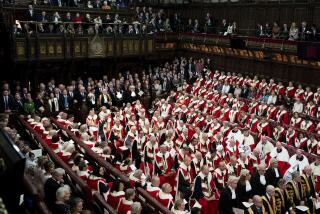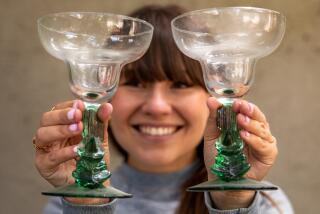More Yanks Buying Their Way Into British Peerage
- Share via
LONDON — Californian John Egan can’t claim he was to the manor born, but for 7,000 ($10,000) he has bought his way into British nobility. The retired schoolteacher has become the new Lord of Wicks Bishop, a title first granted by Richard I and later Henry VIII.
Similarly, Arthur Williams of Dallas said he wanted to make his wife, Martha, “a lady on her birthday.” For 7,000 they were ennobled Lord and Lady of Stratford St. Andrew, a manorship Henry VIII once gave to his fourth wife, Anne of Cleves.
A New Status
The Williamses and Egan acquired their new status recently at a manorial title auction in London’s financial district. Sales were brisk at Painters Hall where, under the gaze of royal portraits lining the room and the glare of TV minicameras, an SRO crowd paid a total of 450,000 ($639,000) for 78 titles. In an auction a few days earlier, 36 titles changed hands for 348,500 ($500,000). Included was the lordship to the former Hampshire home of the Duchess of York (Sarah Ferguson) for 17,000 ($24,140).
The boom in the sale of titles represents yet another chink in the eroding armor of the British aristocracy. Between the world wars the aristocracy lost much of its land, grand houses and servant class, but the titles were bequeathed. Now even that bit of gentility is up for sale to the highest bidder.
People are selling because “they need the money” said Robert Smith, a former publisher who spotted the potential market about five years ago while researching a book on lordships. “It struck us that it was far more valuable (than initial sales prices), and it went from there,” he said. In five years, the average price has gone from 2,000 ($2,840) to 7,000 ($10,000).
Manorial titles date back to feudal times when the monarch granted the title Lord of the Manor and a plot of property to subjects for their loyalty and service.
What do today’s lords and ladies get for their money? In most cases, just the title--the right to call themselves Lord (or Lady) of the Manor. They are entitled to have their new rank printed on their passports, stationery and business cards or etched on their silver and china. Their names will be submitted to Debrett’s Peerage for inclusion in the achievers handbook, but not of course in the authoritative list of true blue bloods.
Historical Documents
Some titles come with historical documents such as court papers and tenant accounts. However, the hundreds-years-old documents are so fragile and of such historical value that they must remain in the local archives.
Occasionally, the purchase includes certain antiquated rights, such as the lord’s right to graze his sheep on the village common. One new lord is trying to exercise his manorial right to market and fair by renting stalls to antique dealers and craftsmen, Smith said.
These days, the sale of a title with a major house or land is almost non-existent. However, one lordship in the recent sale included the ruins (read, crumbling stone wall) of an 11th-Century castle on about four acres in Herefordshire. Snodhill was expected to draw at least 50,000, ($71,000) but was withdrawn when bidding stalled at 31,000 ($44,000). Bids usually began at 6,000 ($8,500), and the top price of the day was 19,000 ($27,000).
Of particular interest at the recent auction, which had been advertised in American newspapers, was the Lordship of Hingham in Norfolk. Manorial experts claim that Hingham is the ancestral home of Abraham Lincoln. According to manorial records, the Lincoln family sold its estates and followed the Rev. Robert Peck and his parishioners to Massachusetts in the 17th Century.
Hingham sold for 11,000 ($15,600), about 4,000 ($5,700) less than expected, to a Dutchman who has been living in Norfolk for 30 years. “With the history, it’s a good buy,” said the new lord, Adrian Surruys, the owner of a sports and leisure center. For him it’s purely an investment, he said.
New lords can apply for a coat of arms and join the Manorial Society of Great Britain, an organization of about 1,000 lords, including 100 Americans. Smith is its chairman and himself a lord.
The reasons people lay out thousands of pounds for seemingly meaningless titles is “fairly nebulous,” he said. “People see status in the title. New rich see it as a first step up the aristocratic ladder. From the American point of view, it’s an attempt to find a link with the old country.”
Martha and Arthur Williams have spent years finding their links to England, so buying the Stratford St. Andrew lordship, as well as another title prior to the auction, was a way of cementing the bond.
Hallowed Survey
“It was because of our English ancestry,” said Mrs. Williams. “We’re just about 100% English. We even have one ancestor listed in Domesday Book.” This hallowed survey record of Britain’s landowners was compiled for William the Conqueror in 1086.
Calling herself an amateur genealogist, she said she has been digging up the family roots since 1956 and has discovered an illustrious family tree. With six ancestors in the American Revolution she is an undisputed member of the Daughters of the American Revolution. One relative was a member of Colonial Virginia’s House of Burgesses.
The Williamses are also descendants of the barons at Runnymede who forced King John to accept the Magna Charta in 1215.
The couple are frequent visitors to England, often to do research for their architectural and interior design firm. But the intent of the last trip was to buy lordships.
Initially, they avoided the auction, choosing instead to arrange to buy the first title through Smith for 8,000 ($11,360). “I thought it was going to be a lot of pressure, like a cattle auction,” she said. Unable to get the Stratford title privately, they went to the sale and found it “was sedate and calm.”
Only in Jest
Shunning the traditional Texas cowboy hat and string tie, the white-haired Williams wore a dark suit and his wife was smartly attired with a fur coat draped around her shoulders.
The title Lord and Lady will be used only in jest, they said. “In the U.S. it doesn’t mean much,” he added.
Anxious to inspect their documents, the Williamses managed to visit their manorial districts during their hectic week.
Ancient Sheepskin
“It was such a thrill to roll out the ancient sheepskin documents from 1532. I was almost teary-eyed. We own them,” she said. She and her husband were distressed that the aging papers were not being preserved carefully. Some were packed in boxes and held together with paper clips.
They are interested in an actual manor house and another lordship. “We’ll watch the auctions and try to get something closer to our Domesday Book ancestor,” he said.
When John Egan was teaching in the Defense Department’s overseas school system, he used to bring medieval crossbows and breastplates to class. “Some people accused me of living in the past,” the new Lord of Wicks Bishop chuckled.
“I’ve always had a keen interest in history, now I’m part of it; I’m in their books. I’m a part of record that goes back to the Norman Invasion.”
A Folksy Manner
Egan, 64, who divides his year between the seaside town of Felixstowe, England, and Concord, Calif., was on his way back to the States when he stopped in at the auction. Dressed casually in an open-necked shirt, he laughed and talked in a folksy manner.
“I had never been to an auction before,” he said. “I thought the prices would go through the roof. I was amazed that they were so cheap.”
Appeals to Tourists
Egan, who organizes educational tours to England, said he may use his title in his business. “That appeals to American tourists,” he noted.
He hopes to be able to donate or sell two of his 10 documents to a museum if allowed. And he fully intends to be available for public appearances in his lordship, which is an area he knows well. Opening fairs or visiting schools, taking part in village events and making donations to local causes are often part of the lord’s duties to his district.
Despite the British belief that Americans are enamored of titles, most of the lordships remained in British hands. But from the sprinkling of brown faces at the auction, Britain’s new titled class is likely to be multi-ethnic.
The new owner of the Sarah Ferguson-connected lordship is rumored to be an Arab. The Lord of the Manor of Butley is a Sikh. In this last round of sales, Sukhdev Singh, an accountant from Leeds, became the second Sikh to buy a title. “I’ve been in this country a long time,” he said. “I belong to its present and hope to belong to its future and now I belong to its history.”
More to Read
Sign up for Essential California
The most important California stories and recommendations in your inbox every morning.
You may occasionally receive promotional content from the Los Angeles Times.













